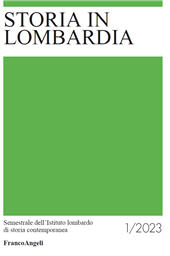Come lo spirito del tempo riadatta la storia : il caso dell'eccidio Rivolta a Monza dopo il Quarantotto
26-43 p.
Il ritorno degli austriaci, dopo la capitolazione di Milano il 5 agosto 1848, si è accompagnato all'adozione di una politica assai repressiva. A Monza il ripristino dell'assoluto e le misure gravose imposte alla popolazione provocano, almeno nelle settimane immedia- tamente successive alla chiusura della breve parentesi rivoluzionaria, manifestazioni di malcontento e di sfida verso l'autorità straniera. È in questo contesto di forte tensione dove la comunicazione fra occupanti e occupati procede tra l'emissione di divieti e doveri da un lato, relativi, almeno in questa prima fase, al controllo dell'ordine pubblico, e la violazione dall'altro, che ha luogo la fucilazione di Carlo e Pietro Rivolta, padre e figlio condannati a morte per il possesso di armi e munizioni.
Questo saggio, nel ricostruire il clima cittadino antecedente e successivo all'eccidio, intende inoltre mostrare come la morte dei Rivolta, nell'Italia unitaria quanto in quella fascista e repubblicana, venga per certi aspetti snaturata rispetto al suo movente originario e resa assonante alle esigenze narrative delle epoche citate. [Testo dell'editore].
The return of the Austrian regime, after the capitulation of Milan on 5 August 1848, was accompanied by the adoption of a very repressive policy. In Monza the restoration of the absolute regime and the heavy measures imposed on the population provoke, at least in the weeks immediately following the end of the brief revolutionary interlude, manifestations of discontent and defiance towards foreign authorities. It is in this context of strong tension where communication between occupants and employed proceeds between the issuance of prohibitions and duties on the one hand, relating, at least in this first phase, to the control of public order, and the violation on the other, that takes place the shooting of Carlo and Pietro Rivolta, father and son sentenced to death for possessing weapons and ammunition.
This essay, in reconstructing the urban climate before and after the massacre, also intends to show how the death of the Rivoltas, in unitary Italy as well as in the fascist and republi- can one, is distorted as compared to its original motive and made assonant to the narrative needs of the epochs cited. [Publisher's text].
Forma parte de
Storia in Lombardia : XLIII, 1, 2023-
Artículos del mismo número (disponibles individualmente)
-
Información
Código DOI: 10.3280/SIL2023-001002
ISSN: 1972-5035
KEYWORDS
- Carlo e Pietro Rivolta, Monza, 1848, martiri italiani, Risorgimento
- Carlo and Pietro Rivolta, Monza, 1848, Italian martyrs, Risorgimento


